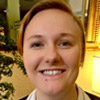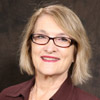


Select one of the options below:
Examine how social influences affect the way we think, feel, and act in this online degree program from CSU.
Challenges facing our world today are increasing domestically and globally. Discover valuable lessons about human and social behavior and the consequences of that behavior. Examine how social influences affect the way we think, feel, and act. Learn to understand, consider, and appreciate perspectives held by others. Navigate complex situations, work in teams, and make professional contributions that make a positive difference.
“I want to be able to use what I learned [at CSU] to break the cycle of injustice in the education field and help those who need help in high school and in college. Using my Spanish skills, I would love to help Hispanic families understand the college process and be able to feel like they are also a part of their children’s experiences.”
—Carina Roman-Solis, Sociology and Spanish Majors
Earn your sociology degree and be able to:
Learn anywhere, anytime with the flexibility and collaboration of online learning. Earn your bachelor's degree from CSU — a regionally accredited research university — no matter where you are located. Maintain balance between your job responsibilities, personal obligations, and studies as you develop professional credentials to pursue a new career or advancement opportunity.
Earning your degree online doesn't mean studying alone. You’ll have many opportunities to interact with instructors and peers throughout the program. Class interactions involve discussion forums, live chat, video conferencing, and email conversations. Study online, on your time.
Develop knowledge and skills to work in a broad range of careers including:
Job titles held by current CSU Alumni with Sociology degrees include:

Kellie Alexander is currently a Ph.D. candidate in the Department of Sociology at Colorado State University. Kellie graduated from the University of Georgia in 2014 with her B.A. and received her M.A. from Colorado State University's Department of Sociology in 2018. Her research interests broadly span crime, deviance, law, and green criminology. Her M.A. thesis explored college students' understandings and perceptions of hazing using qualitative research methods. Kellie also researches in the field of green criminology, specifically looking at the production of harm associated with fracking in Colorado. Kellie's dissertation project currently uses a mixed-methods study to examine administrative responses to university hazing in the U.S. Learn more about Kellie and her publications.
Jason Downing has had a life-long passion for improving race relations and increasing social equality and justice. Issues of food security and food justice have become increasingly important to him the past several years as he and his family have transitioned into owning and operating an organically diverse farm. He is also passionate about environmental issues and how they impact our food systems and health. Jason earned his M.S. from MS Minnesota State University. He has played music professionally since he was 14, and he collects vintage toys.

Lahoma Howard has been teaching sociology courses for CSU since 2012, originally on campus, now online. She currently lives in Georgia, with her husband and two dogs. She has a passion for social justice work, particularly disability justice issues. As a person with a disability herself, she understands many of the struggles that students with disabilities have to overcome to succeed in University and has committed herself to ensuring that every student gets the help they need in her classes. Lahoma also works as a hospital chaplain at Augusta University Medical Center in the Central Savannah River Area and is a member of the United Church of Christ Disability Ministries Board of Directors. Lahoma received her B.A. and M.A. degrees in sociology from Colorado State University, is currently "All But Dissertation" for her Ph.D. in sociology at Colorado State University, and has a Master's of Divinity from Pacific School of Religion, at the Graduate Theological Union in Berkeley California.

Dr. Joanne Littlefield received her Ph.D. from Colorado State University in Public Communication and Technology in 2016. She has been an active member of the International Visual Sociology Association for the past 15 years, including board member roles, and was the IVSA 2017 Prosser Award Winner for Emerging Scholars. Her dissertation, The Visual Rhetoric of U.S. Agricultural Films: Autuers, Actors and Assimilation, provides an examination of societal principles and the role of films and visual communication. She has worked in Land Grant University Extension outreach and communication, in Colorado and Arizona, and is currently writing a book about her research through Colorado, The Social History of Colorado Farmers and Ranchers.
Introduced to Sociology by an inspirational professor in college, Dr. Kelsea MacIlroy is committed to engaging her students through bringing in current and relevant issues and asking students to apply the sociological concepts they are learning to help them understand the larger systems and institutions influencing these issues. Her hope is that students leave her classroom with more insight into the social world and themselves enabling them to be thoughtful and active citizens. In her own work, Dr. MacIlroy focuses on Environmental Justice, Natural Resource & Environmental Sociology, and Rural Sociology. For the past several years she has worked as a Research Assistant with the Colorado Water Institute on issues surrounding agricultural water conservation in the Colorado River Basin.

Dr. Chris Moloney serves as the senior director of Higher Education Consulting at The Association of Governing Boards of Universities and Colleges (AGB). In that role, he leads the development of external engagement and business development strategies, manages a national portfolio of higher education clients, and is a key voice and creator of AGB Consulting’s digital initiatives, including conference presentations, webinars, and Ask the Expert sessions. Moloney maintains an active presence in higher education, serving as an instructor for multiple institutions, including Colorado State University, where he earned his Ph.D. in sociology, and the University of Hawaii at Hilo. His research sits at the intersection of organizational transformation, innovative leadership, and technology. His current work focuses on the digital transformation of public safety agencies and the digital literacy skills and capabilities of public safety industry professionals. Moloney served for five years as the manager of the Sociological Quarterly, a peer-reviewed academic journal with 1,200 institutional subscribers, and as the study abroad program director for Norwich University in the Far East. His research and publication background includes developing and implementing quantitative and qualitative studies in partnership with government agencies and NGOs, and publishing articles and books on a variety of topics within the sociological, criminological, and criminal justice fields. Moloney holds a B.A. from the University of Miami, an M.A. from the George Washington University. He has co-authored three books and many other publications.
Dr. Claudia Rosty received her Ph.D. from CSU and is a native from Brazil. She has been teaching in the Sociology Department since 2017 and her research interests are in social inequality, development studies, rural sociology and gender studies. Dr. Rosty’s dissertation research analyzed the impact of the Fair Trade USA certification in bolstering rural workers' empowerment and promoting gender equity in Brazil and Nicaragua. She is also a Student Affairs practitioner at CSU.
Staci Shaffer has worked in law enforcement since 1995 and is currently a Lieutenant with the Larimer County Sheriff’s Office in Fort Collins, Colorado. She holds a Master of Criminal Justice Degree from the University of Colorado at Denver School of Public Affairs (‘07). In 2011, she was awarded the national designation of Certified Jail Manager by the Jail Management Certification Commission through the authority of the American Jail Association. At the time of the certification, she was one of only 357 professionals awarded this designation nationwide. She has been an adjunct instructor in the Sociology Department at Colorado State University since 2012. In September 2022, she received the Judge Conrad L. Ball award for significant contributions in improving the quality of justice in Larimer County, Colorado presented by the Larimer County Community Corrections Board. She welcomes thoughtful student contributions and encourages self-paced course activity.

Mark Shuey received his M.A. degree with a concentration in Sociology from the University of Colorado in Greeley in May of 2013. He also received the reward for best Master Thesis at UNC in 2013. He has been an adjunct instructor since, recently earning the rank of Senior Instructor. While Mark has instructed a range of classes at CSU, his expertise is in Social Problems, Race and Racism, Deviance, and Sociological Theory.

Noel Strapko’s research and scholarship utilize both qualitative and quantitative methodologies, and her academic focus centers on intersectional social stratification, social boundary construction, and nationalism. Noel regularly teaches courses on sociological theory, methods, social problems, intersectionality, gender, and society.
A minimum of 120 credits are required to complete this degree.
The number of courses needed for completion of the program depends on:
Social and Behavioral Sciences Electives - 21 credits (6 credits of which can be additional SOC courses)
Required courses. Must earn a “C” or better.
9 Credits any level SOC courses
6 Credits upper-division SOC courses (300-400 level)
| Fall semester | June 1 |
| Spring semester | November 1 |
| Summer semester | May 1 |
Start your application online and upload materials directly into the online system. You can save your progress and return any time.
Apply NowPlanning to transfer credits from another college or university? Please review our FAQ page, then complete a Tentative Transfer Evaluation Form to see how your prior credits may transfer.
Refer to admissions.colostate.edu/apply/ for details about who we look for in our individual review process
Call or email our student success team to find out if the program is a good fit for your goals. Our coaches are available Monday-Friday to help you find the right program and navigate the application process.
Student Success Coach: Kyle Yates
Phone: (970) 491-8930
Email: kc.yates@colostate.edu
Complete Colorado State University's online undergraduate application and pay any associated nonrefundable application processing fee (payable online) or waiver (if eligible).
Online applications must be submitted before 5 p.m. (Mountain Time) on the deadline date. If you miss the application deadline, you may still register for courses to begin your program of study as a non-degree student. Students seeking Federal financial aid must be admitted prior to enrolling.
Complete the Free Application for Federal Student Aid. Use FAFSA code 001350. Additional financial aid information is also available.
View your application status at any time to ensure your application checklist is complete or to check on updates.
Admissions decisions are made on a rolling basis and may take up to six weeks during high volume application periods.
Questions? Call (970) 491-8930 or email kc.yates@colostate.edu.